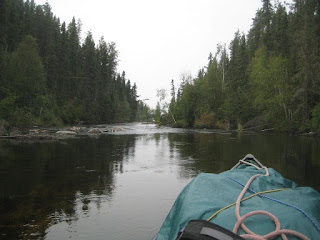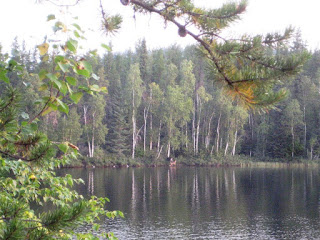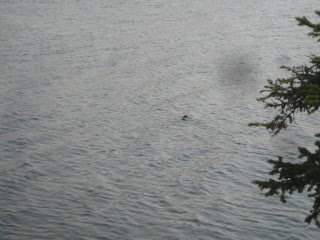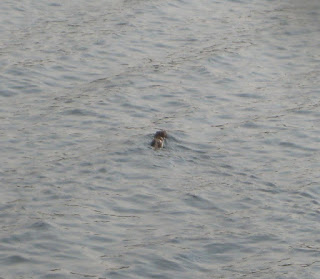Daybreak at camp 32 on August 21 is very cloudy and smoky, not seeing the sun until afternoon. I battle a headwind the entire day.
Rapid 1.
Rapid 2.
Rapid 3.
Heading downstream, there are three rapids to navigate. The first two are simple rapids that I had paddled/poled up on my way in. The third I had portaged past above the rapids using a trail from a parallel lake. Going downstream, I run the third 400 metre rapid, most of which I cannot photograph because I am too busy making a turn and evading boulders in the fast current. The canoe bottom scrapes one boulder and I am thankful I am not using the aluminum canoe. At the base of the last rapids there is a different 350 metre portage to the parallel lake. This portage requires 30 minutes of saw work to clear.
There is a second 150 metre portage to the target lake where, in a shallow 20 metre long narrows, I take off my clothes below the waist to wade and pull the canoe over the rocks, just as I had done on the trip in. But now I do not have the opportunity to dress again as the strong headwind is blowing the canoe back onto the rocks. So I canoe the two km to camp (un)dressed as I am. I arrive at 4:30 pm, glad to stop at previous camp 27, after travelling 15 km including running two small rapids, a 400 metre rapid, two portages (350, 150 metres) and wading a 20 metre shallows.
Day 2 breaks mostly clear, but with smoke haze on the horizon (6:09, 6:10, 6:12 am). Flocks of Canada geese fly south all day long. From my journal: "Nonstop flocks of Canada geese. Hopefully all these geese mean some cooling north weather arriving. 7 pm and very strong cold north wind so decided to go to tent. Prematurely dark, I think from smoke. Very strong wind all night. Closed tent doors both ends."
As I sit at breakfast I hear a splash across the bay that is probably ducks, but I get up to look, and there is what I think at first is a cow moose, but it is a woodland caribou and her calf. Awesome! I wish I had been there when they first came out to drink. On previous trips, I have seen two woodland caribou, but never got a photo.
On this island there are several spring droppings of woodland caribou.
Shortly after spotting the caribou, there is a mink on shore sniffing around the fireplace. Must be the day for encounters. I walk along shore where he disappeared and see him swimming as hard as he can all the way to the next island. Probably as part of his rounds, he visits my island and I am fortunate to be there at the time. Awesome!
Up by 5 am on day 3, a cold 5℃, very cloudy and the strong north wind continues all day after blowing all night. I had planned to fish from shore right away, but decide to erect the canvas tent and stove. There is a suitable open area near camp that does not take long to clear. Just before it starts to rain, I take down the nylon tent, which is exposed to the wind. It looks like I got my wish for cooler temperature with a vengeance.
When gathering stovewood poles, I am limbing a tree I just felled and hear the buzzing of wasps. Having learned the hard way, I vamoose quickly, especially as I only have socks, boots and leather mitts on to work in the rain. I do get stung once in my armpit. Lucky no worse. Aie! I think the rain helps keep the wasps calmer than they might have been. Wasps enter and exit a hole in the ground within a small triangle of sticks which I am now careful to avoid.
Heavy rain and strong winds continue steadily day and night over the six day period from August 23 to 28. This weather exacerbates the shorter daylight with no sun visible, but it keeps the bugs at bay. Thank goodness I have the canvas tent and wood stove, and a supply of puzzles to work on. I have to fell and saw poles each day to keep a supply of stovewood for warmth and cooking. Typically I work in the rain with no clothes on, just socks, boots and leather mitts to avoid having to constantly dry clothes. When working, I am plenty warm enough, sweating even, in the single digit temperatures. With the stove-heated tent I am able to warm up easily, even going for a cold bath in the lake, after which it does take a while to stop shivering in the tent, but man it feels good. I am able to catch pike several days for supper, canoeing out twice when the rain lessens (with clothes on, just so you know). There are lots of lingonberries on the island and I pick many servings ahead. The berries are still quite firm and keep well.
A family of merganser ducklings scoot across the surface of the lake, still unable to fly, although they do flap their wings and lift off a little bit. There does not seem to be a mother, so perhaps they are left completely on their own now.
Strong wind drives waves and whips smoke away from stovepipe in canvas tent.







































